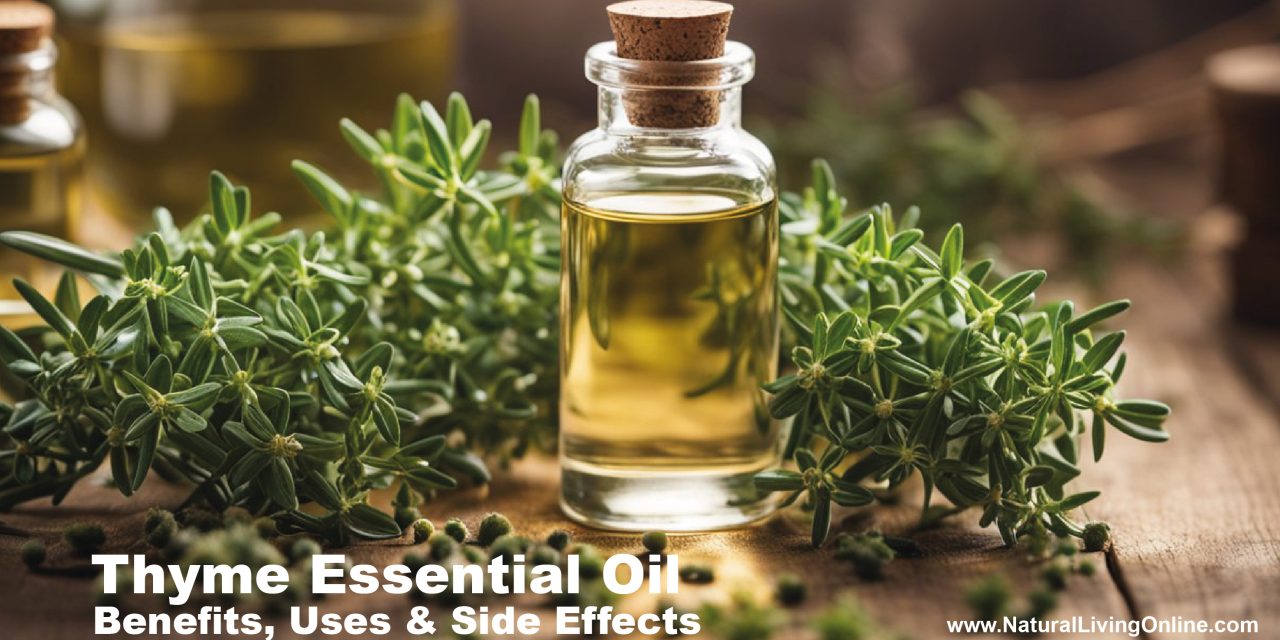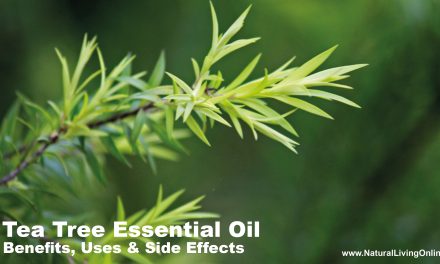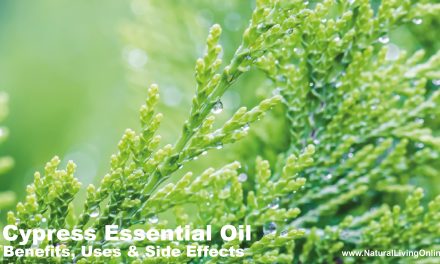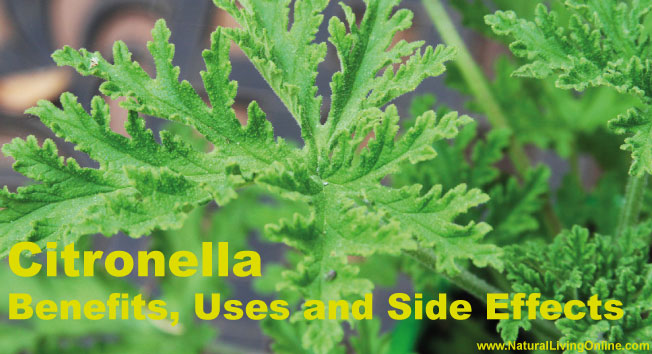Thyme essential oil is extracted from the leaves and flowers of the thyme plant, a perennial herb known for its potent fragrance and culinary uses. Throughout history, thyme has been celebrated for its medicinal properties, and its essential oil form is no exception. With a rich profile of bioactive compounds, like thymol, thyme essential oil is hailed for its ability to support health and well-being in numerous ways.
Utilized in aromatherapy and topical applications, thyme oil is commonly employed for its antimicrobial properties. The oil’s ability to fight bacterial infections makes it a valuable natural remedy for respiratory conditions, skin concerns, and even improving oral health. However, while the benefits of thyme essential oil are compelling, its use is not without caution. It’s important to be aware of potential side effects, especially when using it undiluted or taking it internally without professional guidance.
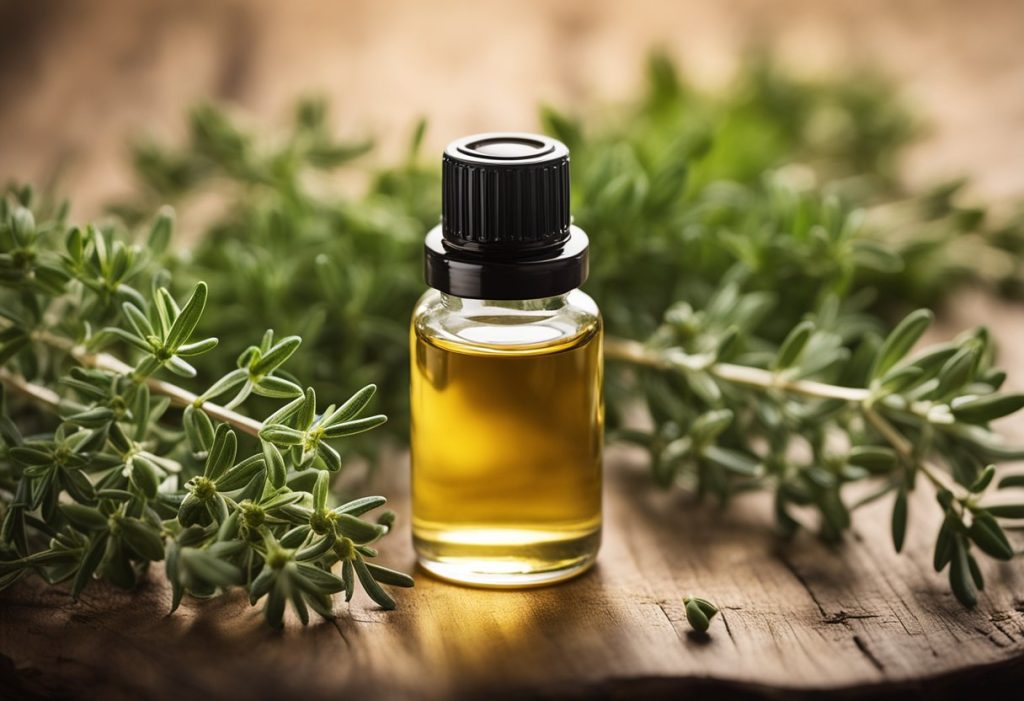
Key Takeaways
- Thyme essential oil is valued for its antimicrobial and therapeutic properties.
- It is used in various forms including aromatherapy and topical application.
- Safe usage requires awareness of potential side effects and proper dilution.
Background of Thyme Essential Oil
Thyme essential oil is revered for its extensive use throughout history and its diverse applications in aromatherapy and traditional medicine. Extracted from the Thymus vulgaris plant, it possesses distinctive properties and a compelling backstory.
Historical Use and Origin
Thyme’s pedigree as an herb of importance can be traced back to ancient civilizations. The Egyptians used it in the embalming process, acknowledging its preservative qualities against decay. Meanwhile, it held significance in Ancient Greek society where it was a symbol of courage and was burnt as incense in temples for its aromatic essence. Throughout the ages, it has maintained a reputation as a multi-purpose botanical.
Botanical Profile
Thymus vulgaris, commonly known as garden thyme, belongs to the mint family. This perennial herb is recognized by its small, gray-green leaves and pale purple flowers, which are rich in the essential oils that are steam-distilled to produce thyme essential oil. The plant is native to the Mediterranean region but is now cultivated worldwide for its essential oil, well-appreciated for its antiseptic and calming properties.
Essential oil Profile
Botanical Name: Thymus vulgaris
Common Names: Thyme
Plant Family: Lamiaceae (mint family)
Countries of Origin: Thyme is native to the Mediterranean region, particularly southern Europe, but it is also cultivated in various regions around the world.
Extraction Method: Thyme essential oil is typically extracted through steam distillation of the fresh or dried leaves and flowering tops.
Parts Used: Leaves and flowering tops
Essential Oil Smell: Thyme essential oil has a strong, herbaceous aroma with warm, spicy, and slightly medicinal undertones. It is reminiscent of the scent of fresh thyme leaves.
Essential Oil Color: Clear to pale yellow.
Viscosity: Thin
Perfumery Note: Middle Note
Strength of Aroma: Strong
Blends Well With
- Citrus oils like lemon and orange
- Herbal oils such as lavender and rosemary
- Woody oils like cedarwood and pine
- Spice oils like cinnamon and clove
Therapeutic Properties
- Antimicrobial
- Antiseptic
- Antioxidant
- Expectorant
- Stimulant
- Immunostimulant
Uses
- Aromatherapy: Thyme oil is used in aromatherapy to promote mental clarity, boost energy, and support respiratory health. It is often diffused or used in massage blends.
- Skincare: Due to its antimicrobial and antioxidant properties, thyme oil is used in skincare products to help treat acne, reduce inflammation, and soothe skin irritations.
- Haircare: Thyme oil is added to haircare products for its purported ability to stimulate hair growth, improve scalp health, and reduce dandruff.
- Culinary: Thyme oil is sometimes used as a flavoring agent in culinary applications, although it is less common than using fresh or dried thyme leaves.
Contraindications
- Thyme oil is generally safe for topical and aromatic use. However, it should be used in moderation and diluted properly before applying it to the skin, as it may cause skin irritation in some individuals.
- Pregnant and breastfeeding women should avoid using thyme oil, as it may stimulate uterine contractions.
Side Effects
- In rare cases, thyme oil may cause skin irritation or allergic reactions. Perform a patch test before using it topically and discontinue use if any adverse reactions occur.
- Avoid ingesting thyme oil as it can be toxic and may cause gastrointestinal upset.
Types
- There are several chemotypes of thyme plants that produce essential oils with slightly different aromatic profiles and chemical compositions, including Thymus vulgaris ct. thymol, Thymus vulgaris ct. linalool, and Thymus vulgaris ct. carvacrol.
Chemical Constituents with Percentages
- The chemical composition of thyme essential oil can vary depending on factors such as the chemotype of the thyme plant and the extraction method used. Some of its main constituents include:
- Thymol (20-50%)
- Carvacrol (5-20%)
- Linalool (5-15%)
- Terpinen-4-ol (2-10%)
- Caryophyllene (1-8%)
The percentages may vary depending on factors such as the age of the plant, the part of the plant used, and the environmental conditions in which the plant grows.
Key Components
The primary phytochemicals found in thyme essential oil are thymol and carvacrol. These phenolic compounds are recognized for their strong antibacterial and antifungal activities. Thymol, the more abundant of the two, is a monoterpene phenol that typifies thyme oil’s antimicrobial and antiseptic qualities. Carvacrol plays a similar role, augmenting the oil’s robustness against various pathogens.
Health Benefitting Compounds
Apart from thymol and carvacrol, thyme essential oil contains other health-benefitting compounds:
- Linalool: A naturally occurring terpene alcohol that provides antimicrobial and anti-inflammatory properties.
- Borneol: Offers analgesic and anti-spasmodic effects, which can alleviate discomfort.
- Camphene: This monoterpene exhibits antioxidant properties, which can help protect cells from oxidative stress.
- Caryophyllene: A sesquiterpene that also acts as a dietary cannabinoid, potentially offering anti-inflammatory benefits.
Each of these components contributes to the oil’s strong antioxidant capabilities, further underlining thyme oil as a significant aromatic essence in therapeutic contexts.
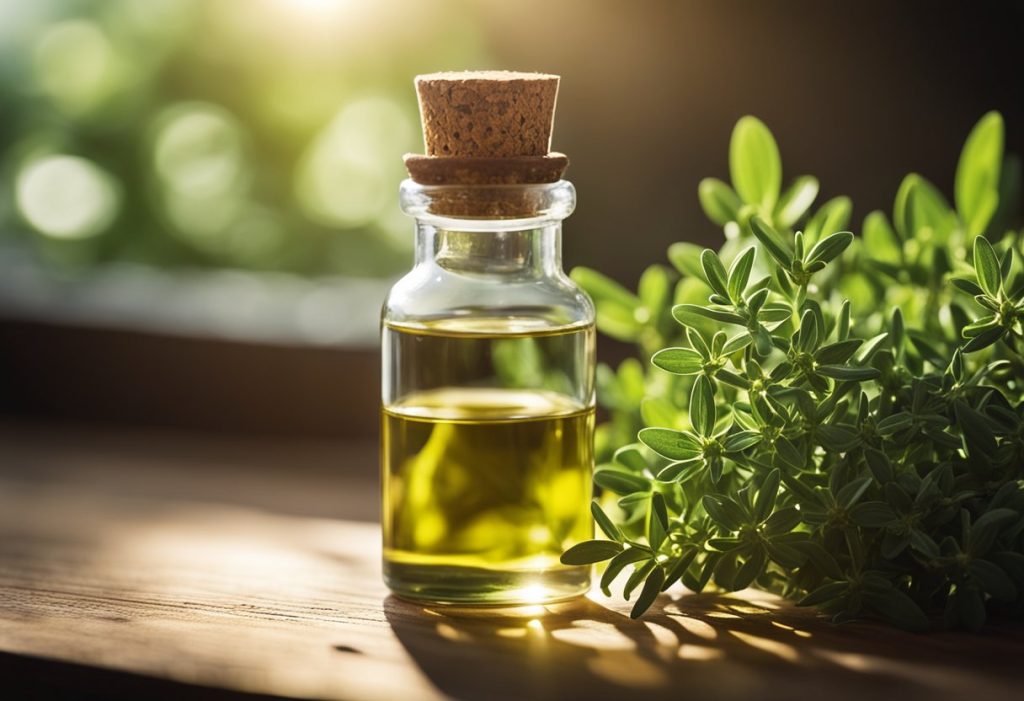
Health Benefits and Uses
Thyme oil boasts a variety of health benefits, ranging from medicinal purposes to everyday use in cooking and skincare. Its properties support various systems within the body and offer therapeutic advantages, culinary applications, and benefits in skin care and cosmetics.
Therapeutic Advantages
Thyme essential oil contains thymol, which is known for its antibacterial and antifungal properties. This makes it a valuable ally in combating respiratory infections and coughs. It is also said to possess antispasmodic properties, potentially easing conditions like arthritis. The use of thyme essential oil can benefit the immune system and help maintain blood pressure within normal ranges.
Culinary Applications
In the kitchen, thyme essential oil is used to enhance the flavor of various dishes. It is appreciated for its aromatic and preservative qualities, particularly in Mediterranean cuisine. When used sparingly, it can aid in digestion and support the digestive system, adding both flavor and health benefits to meals.
Skin Care and Cosmetic Use
For skin care, thyme essential oil is applied for its purifying effects, particularly in products aimed at controlling acne. Its antibacterial properties can help cleanse the skin and may support the treatment of certain skin conditions. Additionally, its antioxidant components make it suitable for use in anti-aging products, helping to protect skin from environmental stressors.
Safety Profile and Side Effects
When considering the use of thyme essential oil, it is crucial for individuals to understand its safety profile and the potential side effects that can occur. This section provides guidance on its proper use and the potential risks associated with its application.
Guidelines for Use
Thyme essential oil should be used with care, following these specific recommendations:
- Dilution: Before applying to the skin, dilute the oil with a carrier oil to minimize skin irritation.
- Patch Test: Perform a patch test to check for allergic reactions before widespread use.
Potential Risks
- Pregnancy and Children: Pregnant women and children are typically advised not to use thyme oil without the advice of a healthcare provider.
- Allergic Reactions: Individuals with allergies to Lamiaceae family herbs might experience allergic reactions to thyme oil.
- Skin Irritation: Undiluted thyme oil can cause irritation; therefore, approach topical applications with caution.
- Blood Clotting: People with clotting disorders or those using anticoagulant medications should avoid thyme oil due to its potential effect on blood clotting.
- Surgery: If you are scheduled for surgery, stop using thyme oil at least two weeks before your operation to prevent interference with blood clotting.
Integrating Thyme Oil into Your Routine
Integrating thyme oil into your routine can enhance personal well-being and bring a fresh aroma to your environment. It’s a versatile oil used in various methods ranging from aromatherapy practices to household benefits, adding therapeutic and antiseptic qualities to your daily life.
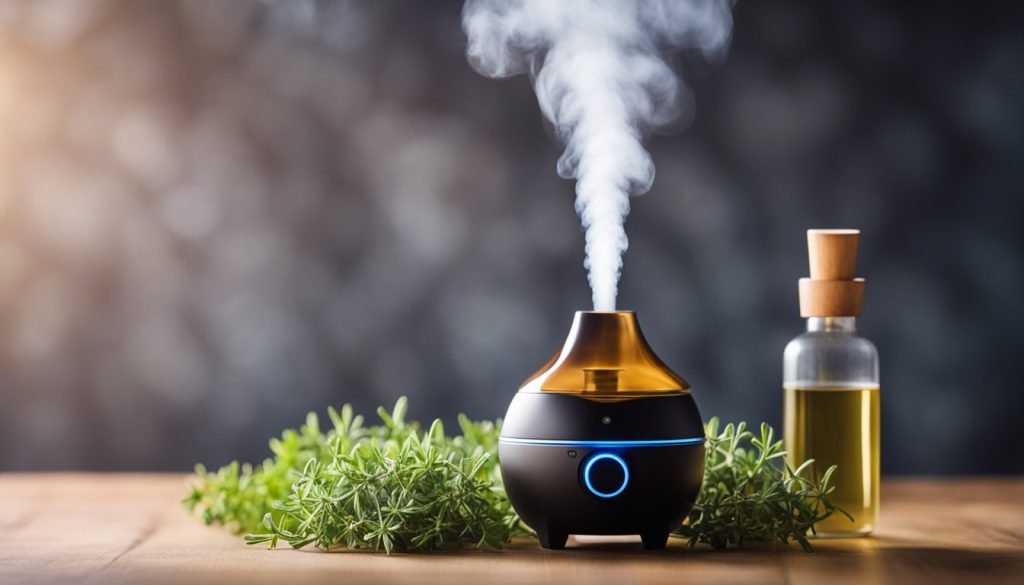
Aromatherapy Practices
Aromatherapy: Thyme essential oil can be diffused to purify the air and provide an energizing atmosphere. It’s known for its ability to assist in alleviating stress. Simply add a few drops of Thyme Thymol Essential Oil to your diffuser, or create a custom blend with other essential oils for a personalized aroma.
Medicinal Uses: When feeling congested, adding thyme oil to steam inhalation can act as an expectorant. Also, incorporating a few drops in a hot bath can help soothe tired muscles and support digestion.
Household and Lifestyle Benefits
Cooking and Recipes: While the essential oil is not recommended for ingestion, fresh thyme and its leaves enrich culinary dishes with their distinct flavor. They can be added to recipes to infuse foods with taste and promote digestion.
Tea: For a gentle effect, a tea made from the leaves of thyme can be beneficial for soothing the throat and promoting digestive health.
Household Uses: Thyme oil, owing to its antiseptic properties, can be used in DIY cleaning products to help sanitize surfaces in the home.
Personal Care: In terms of personal hygiene, thyme oil can sometimes be found in mouthwashes and toothpastes. However, caution is advised, as it should only be used in formulations designed for oral care.
Incorporating thyme essential oil into these facets of life can be beneficial, but it is important to note the potential side effects, such as allergic reactions or skin sensitivity. It’s always best to consult with a healthcare professional before starting any new medicinal use, especially if it involves essential oils.
Frequently Asked Questions
What are the top health benefits of using thyme essential oil?
Thyme essential oil may help kill infections and bacteria, reduce anxiety, eliminate toxins from the body, and has been traditionally used to alleviate symptoms of the common cold. Its potential benefits in supporting the immune and digestive systems have also been noted.
How can thyme oil be used for skin care?
This oil can be diluted with a carrier oil, such as grapeseed oil, and applied to the skin to reduce blemishes and support healthy-looking skin. Regular use might also contribute to healthy hair growth.
Are there any known side effects associated with the use of thyme oil?
Some individuals may experience allergic reactions such as hay fever symptoms, dizziness, conjunctivitis, or asthma upon using thyme oil. It is also advised to avoid consuming thyme oil or applying it undiluted to prevent digestive discomfort and muscle weakness.
What medicinal properties does thyme essential oil possess?
Thyme essential oil is believed to exhibit antiseptic, antirheumatic, expectorant, and carminative properties. It has also been used as a natural remedy for a range of ailments, including respiratory conditions, arthritis, and infections.
Can thyme essential oil improve cognitive functions or brain health?
Research regarding thyme essential oil’s direct impact on cognitive functions and brain health is limited. It has been reported to reduce anxiety, but more evidence is required to substantiate claims of improved cognitive functions or brain health.
There is no scientific evidence to suggest that applying thyme oil to the belly button provides any specific health benefits. Healthcare professionals do not commonly recommend this practice, and you should approach it with caution.
References
Thymus vulgaris essential oil: chemical composition and antimicrobial activity
Anti-Inflammatory and Antimicrobial Properties of Thyme Oil and Its Main Constituents
This website does not provide medical advice.
All information provided on this website, and on associated social media networks, including but not limited to texts, images, and numbers are for general information purpose only. It is not intended as medical advice and it does not include all possible precautions, side effects, or interactions that may occur. Neither NaturalLivingOnline.com nor its author/founder take responsibility for how you use this information. Statements contained on NaturalLivingOnline.com have not been evaluated by the FDA. You should conduct thorough research via multiple sources and consult your physician or qualified doctor before using any essential oil or herbal remedy. Information on NaturalLivingOnline.com must not be relied upon for medical, legal, financial or other decisions.

